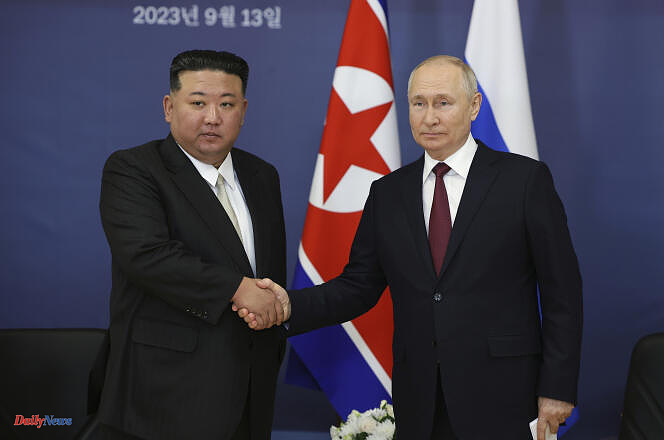Russia justified itself, on Friday March 29, for having imposed the day before the dissolution of the UN sanctions monitoring system against North Korea and its nuclear program. This coup was carried out with the consent of China, but it was castigated by the United States and its allies, who denounce collusion between Moscow and Pyongyang.
North Korea has been subject to UN Security Council sanctions linked to its nuclear program since 2006, reinforced several times in 2016 and 2017. Since 2019, Russia and China, which highlight the humanitarian situation of the North Korean population, are demanding the reduction of these sanctions of unlimited duration.
Having failed in their case, the Russians targeted the committee of experts responsible for monitoring the application of these measures, a committee whose reports refer to. Despite several postponements of the vote to allow negotiations, Russia vetoed on Thursday a draft resolution extending the mandate of this committee by one year. The text received thirteen votes in favor, with China abstaining.
This veto “is in effect an admission of guilt. Moscow no longer hides its military cooperation with North Korea (…) as well as the use of North Korean weapons in the war against Ukraine,” reacted Ukrainian Foreign Minister Dmytro Kuleba. “What Russia cynically did today undermines peace and security in the world, all to promote a corrupted barter that Moscow has sealed” with Pyongyang, on arms in particular, castigated Matthew Miller, the spokesperson for the US State Department.
A final damning report for Pyongyang
The Russian ambassador to the UN, Vassily Nebenzia, justified his country's position by saying that, in current conditions, the committee no longer has any reason to exist, focusing on "issues of no interest to the measure of the problems facing the peninsula”. He instead proposed to the Security Council a reassessment of the sanctions regime. “If there was an agreement for an annual renewal of sanctions, the mandate of the expert committee would make sense,” he explained. His proposal is supported by China. “The current situation on the Korean Peninsula remains tense, and blindly imposing sanctions cannot resolve the problem,” a Chinese Foreign Ministry spokesperson said Friday.
For the United States and its allies, starting with South Korea and Ukraine, the Russian veto is an encouragement to North Korea to continue to circumvent international sanctions, as detailed in the last and final report of the UN committee of experts.
In this six hundred page long document released at the beginning of March, the experts noted that North Korea continues to "flout the Security Council sanctions", in particular by developing its nuclear program, launching ballistic missiles, violating the maritime sanctions and limits on oil imports. The committee also claimed to have begun to investigate "reports" of North Korea's export of "conventional weapons and munitions" in violation of sanctions, in particular to Russia.
“It’s like destroying surveillance cameras.”
This explains the strong reaction of Ukraine and South Korea. In a statement from South Korea's foreign ministry, Seoul called Russia's veto an "irresponsible decision." “There can be no justification for the disappearance of the guardians of the sanctions regime,” South Korean Ambassador to the UN Joonkook Hwang condemned Thursday. “It’s like destroying surveillance cameras to prevent being caught red-handed. »
“This veto is not a sign of concern for the North Korean people or the effectiveness of the sanctions. This concerns Russia, which obtains the freedom to violate sanctions in search of weapons to use against Ukraine,” denounced the British ambassador to the UN, Barbara Woodward.
It is “an attempt to cover up illegal arms transfers between North Korea and Russia. (…) This will have serious consequences on the implementation of Security Council resolutions and the response to destabilizing actions” by Pyongyang and “undermine the global non-proliferation architecture”, according to the European Union.
“Russia has now used its veto to put an end to two expert committees, due to the development of its military relations with these governments,” denounced in a joint statement the United States, France, Japan, the South Korea and the United Kingdom, also referring to Mali.
Last August, showing its support for Bamako, Russia blocked a resolution which would have extended the mandate of the experts who had delivered damning conclusions for the Malian junta and its “foreign security partners”.












